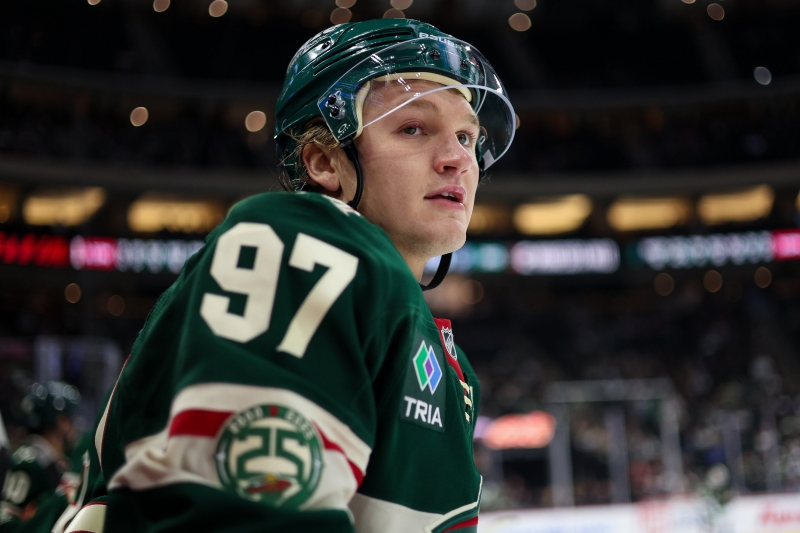After an anxious summer, the Minnesota Wild finally signed Kirill Kaprizov to a contract extension on Tuesday morning. St. Paul renamed West 7th Street “West 97th Street” in honor of their franchise player. Wild owner Craig Leopold presented him with a $136 million contract, the largest in NHL history, validating his word that nobody would offer him more money on his next deal.
It’s the type of celebration you would expect for a player who has become one of the greatest in the history of the franchise. He’s as big an attraction as the Yak Man at your county fair. But when all of the celebration settles down, the next step is to take a look at the fine print.
Few will question the average annual value of $17 million. The Wild needed to sign this player. Even with the large price tag, the increase of the salary cap and a young core that should come of age could help Bill Guerin and the rest of the front office work around it. However, another concern for Wild fans may be the length of the deal, which presents a unique risk-reward case.
To start, nobody is questioning the decision to re-sign Kaprizov. Since the NHL implemented several rule changes following the lockout that canceled the 2004-05 season, only Alex Ovechkin (269), Steven Stamkos (208), and Auston Matthews (199) have scored more goals within the first five years of a player’s career than Kaprizov’s 185.
Kaprizov’s 386 points during his first five seasons are sixth during that timeframe, trailing Ovechkin (529), Sidney Crosby (506), Connor McDavid (469), Evgeni Malkin (418), and Artemi Panarin (415).
Kaprizov is an elite player. You already knew that based on the size of his contract. Even the money is probably worth it, considering that he makes every player around him better, and the NHL’s salary cap is expected to increase over the next several years.
But this is a conversation about the length of the contract. When Kaprizov turned down an eight-year, $128 million contract, one theory was that he was seeking a shorter-term deal. That would have benefitted Kaprizov, who could have signed a four- or five-year deal to attempt to maximize his value in a future that includes more money to go around. However, it could also have benefited the Wild as they look to build their roster.
The Wild has some advantageous contracts on the books at the moment. Joel Eriksson Ek and Brock Faber have signed eight-year deals that will secure them through their 20s. Matt Boldy’s seven-year contract is an even better value that locks him into his prime.
Looking around the league, eight-year deals are also the norm for teams trying to keep their stars. Players such as Nikita Kucherov, Nathan MacKinnon, and David Pastrnak have all signed eight-year deals in recent years. McDavid will likely follow suit whenever (or if) he re-signs with the Edmonton Oilers.
Each of these situations has given its teams few regrets, but Kaprizov carries some hidden risk.
Although he’s a dynamic player when healthy, Kaprizov has played in 70 games just twice in his first five seasons. That number would likely include a third season if his rookie year hadn’t been a 56-game shortened schedule due to the COVID-19 pandemic (he played 55 games that year). Still, the recent years are the biggest concern.
Kaprizov was limited to 67 games during the 2022-23 season with an upper-body injury. While he still managed to score 40 goals and put up 75 points, he wasn’t the same player when he returned for the playoffs, sending the Wild to a first-round loss to the Dallas Stars.
Last year was an even bigger concern for Kaprizov, missing 41 games due to a lower-body injury. While Kaprizov was an MVP-level player on the ice, scoring five goals with nine points in the playoff series against the Vegas Golden Knights, a healthy Kaprizov would have put them in a better position and perhaps an easier matchup.
These feel like champagne problems, but it could become an issue if his durability becomes a concern heading into his 30s. It’s a similar problem to when the Wild signed Zach Parise and Ryan Suter to 13-year deals. While the Wild tried to mitigate that risk by front-loading the contract, this practice became illegal under the collective bargaining agreement that took effect after the 2012-13 lockout.
Relating to Kaprizov, Parise, and Suter were all entering their age-28 season when signing those contracts. Some behind-the-scenes reasons were at play when the Wild bought out their contracts following the 2020-21 season. But while Suter played into his 40s, Parise began to tail off as he went into his mid-30s.
So what does all mean? It likely puts more pressure on the Wild as they head into the second year of Guerin’s five-year plan. While Kaprizov is ready to pick up on his Hart-level form from a year ago, the Wild may only have a few years before he begins to decline. If Minnesota wins a Stanley Cup, no one will care if Kaprizov is on his final skates in his mid-30s. However, it’s still a risk that the Wild hopes will work out in their favor.
